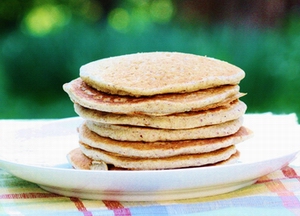 Buckwheat flour is a nutritious and energizing flour that is sourced from the flowers of the buckwheat plant, which is native to Northern Europe and Asia. Because it is free of gluten and wheat, it has become popular as a substitute to white or enriched flour, especially among diabetics and people seeking to lose weight. Moreover, many people simply enjoy cooking with buckwheat because of its robust and earthly flavor.
Buckwheat flour is a nutritious and energizing flour that is sourced from the flowers of the buckwheat plant, which is native to Northern Europe and Asia. Because it is free of gluten and wheat, it has become popular as a substitute to white or enriched flour, especially among diabetics and people seeking to lose weight. Moreover, many people simply enjoy cooking with buckwheat because of its robust and earthly flavor.Below is a recipe for making some delicious and healthy pancakes using buckwheat flour as the central ingredient.
Cooking instructions
The ingredients listed below will make approximately nine five-inch buckwheat pancakes:
• 1 cup of organic buckwheat flour (easily found in health food stores)
• 3/4 teaspoons of baking powder
• 1 pinch of unrefined sea salt or Himalayan salt
• 1 tablespoon of organic maple syrup
• 1 1/4 cups of milk (raw is best)
• 1 tablespoon of organic butter (used as both an ingredient and a cooking lubricant)
• 1 free range egg
Directions:
1.) Mix together the flour, salt, and baking powder. Also, melt some butter in a small pan so that it is liquefied.
2.) Crack the eggs into a bowl, and then add the milk, maple syrup, and liquefied butter into the same bowl. Mix well until the liquids are nicely combined.
3.) Combine the wet ingredients with the dry ingredients using a large spoon. If the mixture appears too thick, then add a little more milk. This will result in a nice, fluffy pancake batter.
4.) Heat the pan and then lubricate it with some butter. When you are ready, pour into the pan a quarter cup of pancake batter and heat on medium until you can see holes form at the top of the pancake. Next, flip over the pancake and cook the other side for another 15-30 seconds.
5.) Once the first pancake is ready, try and keep it warm (unless it is being served immediately) while you make more pancakes using the remaining batter.
Nutritional value
While pancakes of any sort shouldn't be eaten regularly, the ingredients used to make the pancakes above are healthier than their well-known equivalents. Buckwheat itself, for example, is excellent for our cardiovascular system because it contains a high number of flavonoids, which guard the body against disease by acting as antioxidants. These flavonoids also contribute towards buckwheat's well-known fat-lowering properties, since they prevent platelets in the blood from clotting and thus maintain a good blood flow, which protects against heart disease and cholesterol oxides.





